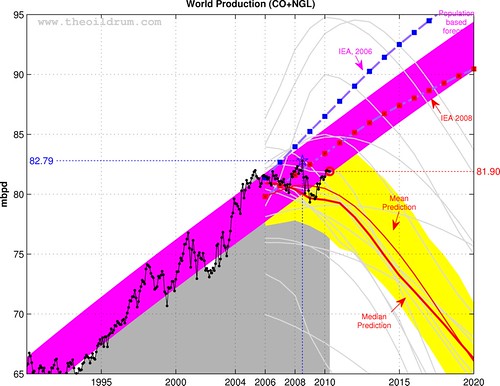'Peak' oil is no longer a fracturing theme. The projections for the year, quinquennium or decade when global oil production would start declining "are now part of history", underlines Luís de Sousa, member of ASPO-Portugal and collaborator of the blog "The Oil Drum", talking to the Expresso. "There is a generalized idea that such period of peak is already being lived. Predicting it is no longer relevant", he adds.
According to this specialist, the vast majority of the important mathematical and accounting models of oil production used by entities independent from the oil industry point to an interval of about a decade centered between 2008 and 2010, for a production interval between 78 and 85 million barrels daily.
Luís de Sousa underlines that "since 2005 world liquids production has been bound between 80 and 82 million barrels per day in clear consonance with those models", but this plateau "has been sustained by the increase of natural gas liquids, with pure crude [petroleum] in decline since that year".
Nonetheless the 'peak' has returned to the spotlight due to a secret report by the futurist studies group of the German Centre for the Armed Forces Transformation, a military think thank work for the Berlin Ministry of Defence. The study was published by "Der Spiegel" casting consternation on those less used to the issue and its geopolitical implications.
 |
The diplomacy of Oil
The report has an alarming tone: "scarcity shall affect everyone" and "oil price increases pose a systemic risk, not only for transport systems, but also for all other sub-systems". And left a message: "It is vital to secure access to oil", for in an horizon up to 2040 we shall assist to "a change of the international security panorama with new risks - like that of fuel transport - and new actors in a possible conflict around the distribution of an increasingly scarce resource".
The german report concludes that "the free oil demand and supply market will shrink" and that oil diplomacy will sky-rocket relatively to its geo-politization.
The rising scarcity referred by the Germans is linked to "an almost rigidity of oil production, fixed within a band that formed since 2004" underlines Luís de Sousa. This variation "band" is called by many specialists, with some humour, "undulating plateau". Meaning, in this plateau, production variations oscillate, like a wave, from year to year, independently of price variations. The present crisis, whose end continues a source of polemics, "will likely prolong this undulating period, flattening what otherwise would have been a prominent peak".
Read full at EuropeanTribune and join discussion at TOD
Related:
- Peak Oil Mirage
- Sharon Astyk: Back to school month: Peak oil 101
- US military must stop using oil in 30 years, defense think tank says
- Oil Rises as China Stockpiles Boost Demand Bets
- Could peak oil save the human species?
- Oil Trades Near Two-Week High, Equities Counter Supply Concern
- Saudi Crude Output Falls 11.3% In 2009
- Peak Oil Demand: The Beginning and End of Oil